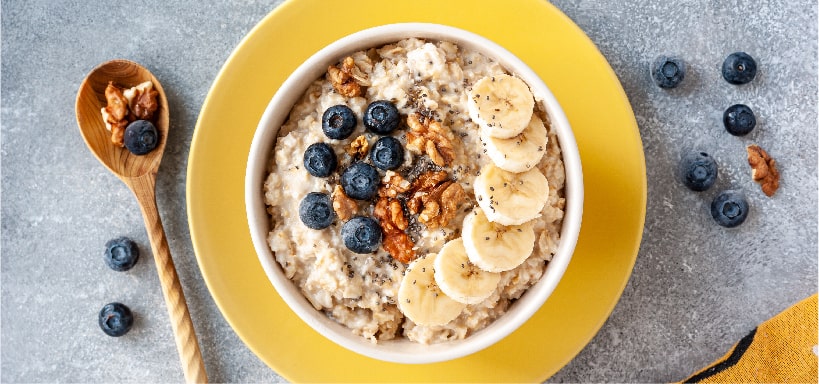
When it comes to your lifestyle and habits, there’s plenty you can do to maintain a positive mindset and outlook, including sleeping enough, exercising and also eating “happy food.”
Eating happily involves consuming plenty of foods that provide nutrients such as protein, tryptophan, omega-3s and vitamin B12, which are linked to better overall mental health.
High-antioxidant foods, as well as complex carbs that provide fiber, are also important for supporting gut health and fighting chronic inflammation – two key aspects linked to mood enhancement. That’s why they are some of the best mood-boosting foods around.
What Is Happy Food?
Happy foods are those that help improve your mood and mental health. They do this by supplying certain nutrients that help your body produce more “feel good” chemicals, such as the neurotransmitter called serotonin.
Nutrients found in foods that can potentially help you feel happier include:
Top 14 Foods That Make You Happy
1. Dark Chocolate
Real dark chocolate (or cocoa/cacao) is full of antioxidants that fight free radical damage, which when left unchecked can damage the brain.
Chocolate is also capable of almost instantly lifting your mood thanks to the presence of compounds such as theobromine and phenylethylamine, which sort of act as “natural antidepressants,” and tryptophan, which helps the brain make serotonin.
2. Salmon and Other Oily Fish
Oily fish such as wild-caught salmon, sardines and anchovies are the best dietary sources of omega-3 fatty acids, which can improve your mood and fight inflammation and depression.
Fish is also very high in protein, made up of amino acids, which your body uses to create neurotransmitters (chemicals that allow brain cells to communicate). Protein foods are known to positively influence your mood and energy — not to mention that they’re filling and can prevent hunger, which is associated with mood swings.
3. Yogurt
As a fermented food, yogurt (as well as other fermented dairy products like kefir and amasi) provides probiotics that help promote a healthy gut environment. A well-functioning gut equals a happier mindset because your body is where the majority of serotonin is made.
4. Berries
Berries are very high in vitamin C and other antioxidants that protect the brain from oxidative stress. Plus they provide other nutrients that are important for cognitive processes, including copper and folate.
5. Olive Oil
Considered to be one of the healthiest fats there is, olive oil provides monounsaturated fatty acids that are known to have anti-inflammatory and neuro-protective effects.
People who consume plenty of olive oil in their diets, including those who eat a Mediterranean diet, tend to experience less depression and better cognitive functioning older age.
6. Walnuts
With their supply of plant-based omega-3s, vitamin E and other antioxidants, plus many minerals, walnuts are among the most widely recommended foods for brain and cognitive health. In fact, one study found that people who regularly consume walnuts as part of an anti-inflammatory diet benefited from increased protection against developing depression.
7. Flaxseed
As mentioned above, gut health and higher intake of healthy fats are both correlated with positive effects on people’s moods. This explains why flaxseeds are considered a happy food, given that they are full of omega-3s known as alpha-linolenic acid (ALA), plus lignans that have antioxidant effects, and both soluble and insoluble types of fiber.
8. Bananas
Bananas are a good source of carbohydrates and electrolytes, which help provide the brain and body with energy, as well as tryptophan, an amino acid that has been shown to have calming properties since it boosts release of serotonin.
READ RELATED: This £30 ergonomic seat cushion provides immediate support and pain relief when WFH
9. Eggs
Eggs, specifically the yolk, are one of the best sources of the compound called choline, which helps boost brain function, including by aiding in learning and memory. Eggs also supply you with protein and vitamin B12, which are needed to keep your energy up.
10. Oatmeal and Other Whole Grains
Whole grains like oats, quinoa, buckwheat, etc., are high in fiber, minerals and even some plant-based protein. They support gut health, since they “feed” healthy probiotic microbes that play a role in regulating inflammation and hormone production.
Plus, carbohydrate-containing meals contribute to synthesis of serotonin.
11. Leafy Greens
Greens such as kale, spinach, Swiss chard and others contain folate, which has been shown to help offer protection against depression. Green veggies are also high in antioxidants and other nutrients that aid in a calm mind and body, including magnesium, which can help with muscle relaxation and digestion.
12. Turmeric
The active ingredient found within turmeric root, called curcumin, has anti-inflammatory properties and has been linked with enhanced mood and mental health in studies.
Researchers believe that turmeric/curcumin may work by positively affecting serotonin and dopamine levels, protecting the brain and mitochondria from damage, and boosting resilience against negative effects of stress.
13. Green Tea
Within green tea you’ll find the neuroprotective compound called epigallocatechin-3-gallate (EGCG), which is linked to benefits including enhanced focus and attention, outlook, calmness, and improved perceptions of stress. Enjoy two to four cups of green tea per day for the most benefits, which also include fighting inflammation.
14. Coffee
Coffee is one of the most popular drinks worldwide, mostly due to its content of caffeine, which is energizing and known to increase motivation and focus. Coffee is also high in antioxidants, and consumption has also been associated with reduced risk of depression.
How to Add to Your Diet
Because there’s such a wide range of happy foods in existence, there are endless possibilities for including them in your diet.
Simple ways to enjoy more of them are to make a daily green smoothie in the morning, followed by a salad later in the day. For dinner, try something like fish with vegetables cooked in olive oil.
You can also sip on green tea and organic coffee throughout the day (along with plenty of water to stay hydrated) in order to keep your energy and mood up.
Here are some simple ways to add more foods that make you happy to your everyday meals:
Risks and Side Effects
There’s really no downside to eating a healthier, anti-inflammatory diet that also supports happier moods.
If possible, choose organically produced ingredients when possible to avoid consuming GMO ingredients and additives. Also limit or avoid processed foods made with added sugar, trans fats and artificial additives, even if they also contain some happy food ingredients.
Try to eat at regular intervals to stabilize your mood and prevent drops in blood sugar, which can make you feel “hangry.” Of course, remember that your diet is one important component of mental health but not the only one — also be sure to prioritize exercise, sleep and managing stress.
Conclusion
- A “happy food” is any ingredient that lifts your mood and supports mental health.
- Examples of happy foods include fish, nuts, seeds, eggs, leafy greens, berries, olive oil and whole grains.
- Add these foods to your diet to increase your intake of nutrients that keep you energized and promote a positive mindset — such as B 12, protein, omega-3s, magnesium and antioxidants.
Source:








